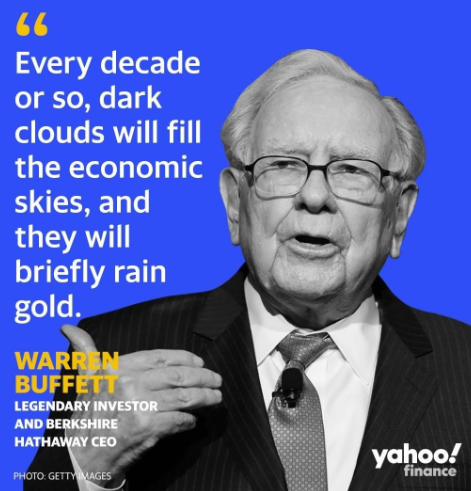The Oracle & Opportunity
The main engine of the U.S. economy is the American consumer. And despite high prices, we are still spending. Last week the Census Bureau reported strong retail sales for April, and they revised March numbers upward. From Barron's last week:
First, retail sales figures rose for the fourth straight month in April…Inflation is of course part of the equation—because prices of everything from food to fuel has jumped, shoppers have to spend more just to purchase the same goods. Yet even outside of inflation, customers seem genuinely still willing and able to spend—an upbeat sign.
(5/18/22)
Recession fears remain elevated after Wal-Mart and Target released earnings last week that came in below expectations. Both companies reported revenue that was better than expected. Investors were caught off guard of the magnitude of inflation’s negative impact on profits (supply chain issues, fuel, freight, wages). But the government confirmed that Americans have not slowed spending, they’ve simply shifted their dollars from goods to services (travel, dining, concerts, etc.) Not all companies are reporting lackluster earnings. Home Depot just reported their best first quarter ever.
The Federal Reserve of Atlanta’s GDPNow forecasting tool which, according to them ‘provides a running estimate of real GDP (economic growth) based on available economic data for the current quarter.’ The most recent report indicates our economy is growing at 2.4% (5/18/2022). This represents a significant slowdown from last year (5.7%), but it’s consistent with our growth rate over the past decade.
Investors are fearful and growth stocks have crashed this year:
Facebook, -42% YTD
Snap, -52%
Spotify, -53%
Netflix, -69%
Shopify, -73%
Rivian, -73%
Nvidia, -42%
Pintrest, -38%
Tesla, -36%
Paypal, -57%
Moderna, -46%
Square, -48%
Coinbase, -74%
DoorDash, -49%
Peloton, -56%
source: CNBC (5/23/2022)
It’s called a ‘correction’ for a reason. Many of these stocks were wildly overpriced based on traditional metrics.
Fortunately, there are signs inflation is finally cooling off, from Barron’s:
Right now, the market is indicating that inflation is expected to average 2.86% a year for the next 10 years, according to data from the St. Louis Fed…The logic is that demand will decline as consumers spend the excess cash they built up during the pandemic crisis, while supply-chain constraints gradually moderate…The latest data seems favorable.
Try not to be alarmed if you hear about more companies missing their earnings expectations, or data showing the housing sector is slowing. Understand the Federal Reserve is trying to reduce inflation, and they’re doing this by increasing the cost of money to reduce demand. Any data showing a slowdown means they’re doing their job. And it also means, perhaps they need not be as aggressive as investors fear. Melvin Capital, a hedge fund run by a well-respected money manager is closing down after suffering steep losses in 2021 and 2022. I believe we’re going to hear about more over-leveraged hedge funds and private equity funds going belly up. This is not a sign of a weakening economy. It’s a sign of money managers failing to manage risk, taking on too much leverage. More words of wisdom from Warren:
You really don’t need leverage in this world much. If you’re smart, you’re going to make a lot of money without borrowing.
Speaking of Warren…check out Warren Buffett's Inflation Plan: Buy, Buy, Buy. The world’s greatest investor, Warren Buffett, spent over $41 billion buying stocks in the first quarter this year, just as markets turned down. This represents his biggest buying spree since 2008 during the Great Financial Crisis, when the stock market was on its way to crashing 37%. Buffett recently added to his largest holding Apple, as well as Chevron, GM, Activision, Restoration Hardware, and Formula One. He made new investments in Occidental Petroleum, Citigroup, HP, Paramount, McKesson, Ally Financial, Markel and Celanes. Most of the $41 billion went to energy (oil & gas). Interesting because the energy sector has not performed particularly well in the last 2 recessions. In the Covid Crash of 2020 oil collapsed from $60/barrel to negative $37! And during The Great Financial Crisis, oil cratered 70% falling from $133/barrel in June, to $39 by early 2009. In 2007, GM shares were trading above $40/share, but by early 2009 it was a penny stock trading for around a buck, and the company ultimately went bankrupt. The bulk of Berkshire’s stock purchases went to sectors that historically perform horribly in recessions. From my perspective, looks like the ‘Oracle of Omaha’ does not believe a recession is imminent. It appears he views the market’s weakness as a buying opportunity. We happen to agree and have been buying recently.
Historically, stocks beat inflation over the long run. And despite volatility in the market, some things don’t change. We must build a comprehensive plan that will sustain you and your family in a multi-decade retirement. We’re here to help.
I look forward to discussing further with you.
Thank you!
-randy
The opinions expressed in this newsletter are for general informational purposes only and are not intended to provide specific advice or recommendations for any individual or on any specific security. It is only intended to provide education about the financial industry. To determine which investments may be appropriate for you, consult your financial advisor prior to investing. Any past performance discussed during this program is no guarantee of future results. Any indices referenced for comparison are unmanaged and cannot be invested into directly. As always please remember investing involves risk and possible loss of principal capital; please seek advice from a licensed professional.
Hamilton Wealth, LLC is a registered investment adviser. Advisory services are only offered to clients or prospective clients where Hamilton Wealth, LLC and its representatives are properly licensed or exempt from licensure. No advice may be rendered by Hamilton Wealth, LLC unless a client service agreement is in place.

